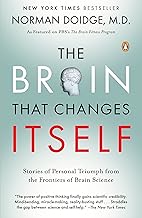
Why We Sleep: Unlocking the Power of Sleep and Dreams
Matthew Walker, Steve West, et al.
4.7 on Amazon
19 HN comments

Thinking, Fast and Slow
Daniel Kahneman, Patrick Egan, et al.
4.6 on Amazon
16 HN comments

The Design of Everyday Things: Revised and Expanded Edition
Don Norman
4.6 on Amazon
15 HN comments

The Body Keeps the Score: Brain, Mind, and Body in the Healing of Trauma
Bessel van der Kolk M.D.
4.8 on Amazon
9 HN comments

The Black Swan: Second Edition: The Impact of the Highly Improbable: With a new section: "On Robustness and Fragility" (Incerto)
Nassim Nicholas Nicholas Taleb
4.5 on Amazon
8 HN comments

The Righteous Mind: Why Good People Are Divided by Politics and Religion
Jonathan Haidt and Gildan Media, LLC
4.6 on Amazon
8 HN comments

The War of Art: Break Through the Blocks and Win Your Inner Creative Battles
Steven Pressfield and Shawn Coyne
4.6 on Amazon
5 HN comments

How to Change Your Mind: What the New Science of Psychedelics Teaches Us About Consciousness, Dying, Addiction, Depression, and Transcendence
Michael Pollan and Penguin Audio
4.7 on Amazon
4 HN comments

The Brain That Changes Itself: Stories of Personal Triumph from the Frontiers of Brain Science
Norman Doidge
4.7 on Amazon
4 HN comments

The Tipping Point: How Little Things Can Make a Big Difference
Malcolm Gladwell and Hachette Audio
4.4 on Amazon
4 HN comments

Maps of Meaning
Jordan B. Peterson and Random House Audio
4.8 on Amazon
3 HN comments

Man's Search for Meaning
Viktor E. Frankl , William J. Winslade, et al.
4.7 on Amazon
3 HN comments

How Emotions Are Made: The Secret Life of the Brain
Lisa Feldman Barrett, Cassandra Campbell, et al.
4.6 on Amazon
3 HN comments

Humankind: A Hopeful History
Rutger Bregman , Erica Moore, et al.
4.7 on Amazon
3 HN comments

Emperor of All Maladies: A Biography of Cancer
Siddhartha Mukherjee
4.8 on Amazon
3 HN comments
samplonApr 11, 2021
He writes about this clearly and elegantly—must read for those dealing with anxiety, and certainly with any traumatic stress.
101011onJuly 12, 2021
ntlkonJune 6, 2021
ternonApr 12, 2021
For other relevant scientific perspectives, I recommend looking into the theory around "memory reconsolidation."
- Kaj Sotala does a good job of summarizing an important book in the field here: https://www.lesswrong.com/posts/i9xyZBS3qzA8nFXNQ/book-summa...
- How Emotions are Made also provides a perspective from neuropsychology on what's going on: https://www.amazon.com/How-Emotions-Made-Lisa-Barrett/dp/132....
- The Polyvagal Theory stuff mentioned in the article is also great, and some classic accessible books on the overall topic include The Body Keeps the Score and Waking the Tiger.
I'm personally a fan of a technique called Emotional Resolution (EmRes), which is notably simple and effective, and that you can learn to apply to yourself after a 90 minute course, but there are many other approaches: Organic Intelligence, somatic experiencing, cranio-sacral therapy, bioenergetics and core energetics, and many more. Effective self-therapy methods include Core Transformation, Focusing, and "self-therapy".
Keywords to search for are: "somatic therapy," "body work," "energy work" or "energy medicine."
jm__87onJuly 12, 2021
Edit: I will also add that The Body Keeps The Score is an interesting book, but I would definitely not recommend everyone read it. If you have suffered some trauma it is definitely worth a read.
anonymouswackeronApr 12, 2021
The Body Keeps the Score is a pretty good book that covers how much trauma affects the body in myriad ways.
ryanchantsonApr 22, 2021
The Body Keeps the Score: Brain, Mind, and Body in the Healing of Trauma, overview of how PTSD forms and how to use break the patterns
wiggumspiggumsonApr 5, 2021
I would have thought that since traumatic experiences have been around forever, humans would have adapted to dealing with those better by now. And yet the medical evidence laid out in this book seems to show that healing from traumas is difficult. To me, that means there is something "unnatural" about trauma (or at least the most awful cases).
I'm probably not doing the book enough justice. Here's the goodreads profile for anyone who wants to explore further: https://www.goodreads.com/book/show/18693771-the-body-keeps-...
ddorian43onJune 2, 2021
> And does that imply that an avoidance strategy, or a wise-cracking support group, might have better mental health outcomes than time with an empathetic therapist ?
See fight-flight-freeze-fawn response: https://www.psychologytoday.com/us/blog/addiction-and-recove....
But generally, yeah, that's a lot. Try going to therapy. Or reading a book like "The body keeps the score" that explains how trauma affects people (including things that happened to you). I think you might find yourself in some pages of that book.